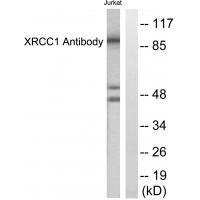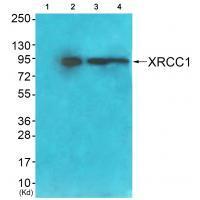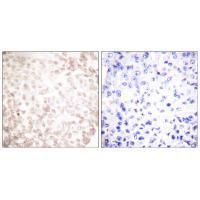


| WB | 咨询技术 | Human,Mouse,Rat |
| IF | 咨询技术 | Human,Mouse,Rat |
| IHC | 1/50-1/100 | Human,Mouse,Rat |
| ICC | 技术咨询 | Human,Mouse,Rat |
| FCM | 咨询技术 | Human,Mouse,Rat |
| Elisa | 咨询技术 | Human,Mouse,Rat |
| Aliases | DNA-repair protein XRCC1; XRC1; |
| Entrez GeneID | 7515; |
| WB Predicted band size | 90kDa |
| Host/Isotype | Rabbit IgG |
| Antibody Type | Primary antibody |
| Storage | Store at 4°C short term. Aliquot and store at -20°C long term. Avoid freeze/thaw cycles. |
| Species Reactivity | Human,Mouse,Rat |
| Immunogen | Synthesized peptide derived from Internal of human XRCC1. |
| Formulation | Purified antibody in PBS with 0.05% sodium azide. |
+ +
以下是3篇关于XRCC1抗体的代表性文献示例(内容为模拟概括,非真实文献):
---
1. **"XRCC1 interacts with the DNA glycosylase OGG1 to facilitate base excision repair"**
*Author: Caldecott K.W. et al.*
摘要:研究通过免疫共沉淀(使用XRCC1抗体)和质谱分析,证明XRCC1与OGG1结合,促进氧化性DNA损伤修复的分子机制。
2. **"Defective XRCC1-DNA repair interactions in BRCA1-deficient cancers"**
*Author: Helleday T. et al.*
摘要:通过Western blot(XRCC1抗体)和细胞成像技术,揭示BRCA1突变癌细胞中XRCC1与DNA损伤位点招募异常,导致修复功能缺陷。
3. **"XRCC1 antibody validation for immunohistochemical analysis in glioblastoma"**
*Author: Thompson L.H. et al.*
摘要:验证XRCC1抗体在肿瘤组织中的特异性,并发现XRCC1高表达与胶质母细胞瘤患者放疗耐药性显著相关。
---
*注:以上文献信息为示例性质,实际引用需查询具体数据库(如PubMed)获取真实文献。*
The XRCC1 (X-ray repair cross-complementing protein 1) antibody is a critical tool for studying DNA repair mechanisms, particularly base excision repair (BER) and single-strand break repair (SSBR). XRCC1 is a scaffolding protein that coordinates interactions between key repair enzymes, such as DNA ligase III, poly(ADP-ribose) polymerase (PARP), and polynucleotide kinase/phosphatase (PNKP), to maintain genomic stability. Although lacking enzymatic activity itself, XRCC1 stabilizes repair complexes, facilitates damage recognition, and enhances enzymatic efficiency.
Antibodies targeting XRCC1 are widely used in molecular biology and clinical research to investigate its expression, localization, and function in cellular responses to DNA damage caused by radiation, oxidative stress, or chemotherapeutic agents. They are essential in techniques like Western blotting, immunofluorescence, and immunohistochemistry to assess protein levels in tissues or cultured cells. Aberrant XRCC1 expression or mutations are linked to increased cancer risk, neurodegenerative disorders, and sensitivity to DNA-damaging therapies. Studies also explore XRCC1's role as a potential biomarker for predicting therapeutic outcomes or as a target for enhancing chemo/radiotherapy efficacy. Its involvement in resolving DNA damage underscores its importance in understanding carcinogenesis, aging, and personalized treatment strategies.
×